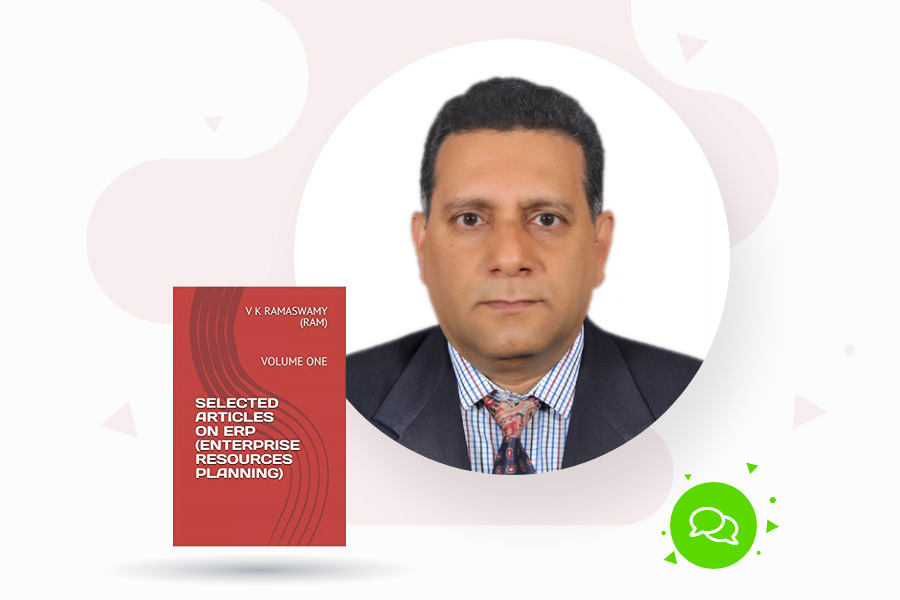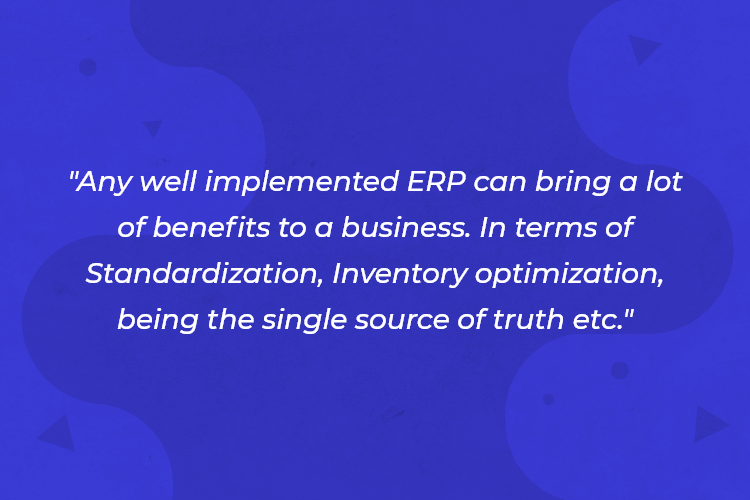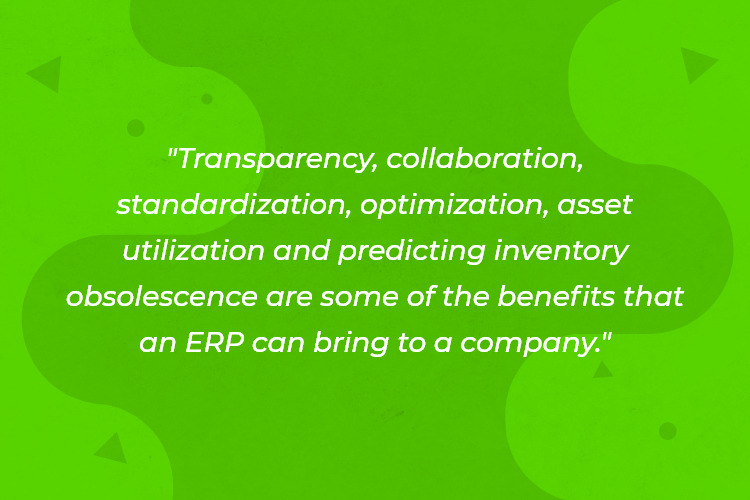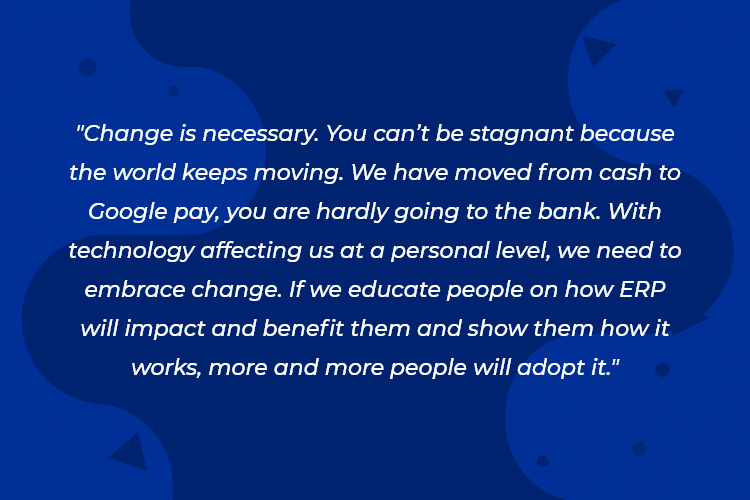
Ramaswamy V Krishnamurti is a published ERP consultant, with over 30 years of experience in the Enterprise Resource Planning field. He has excelled in several roles – Head of IT, Program Manager, Project Manager and Solution Architect. He has worked with organizations all over the world, some of which are the largest organizations in their respective industries. After implementing ERP solutions, he started working as an independent consultant. For the last 5 years he has been advising small and medium businesses that are implementing ERP systems. In 2019 Ramaswamy published a book titled “Selected Articles on ERP” that is available on Amazon. It details various aspects that need to be considered with ERP Implementation.
We sat down with Ramaswamy to get a firsthand account of the ERP industry from someone who has spent their whole career implementing Vault-ERP-like solutions.
Welcome, Mr. Ramaswamy! Thank you for joining us. Before we jump into your 30 plus years of experience, tell us a little about the path that led you there?
After obtaining a degree in Mechanical Engineering, I joined Steel Authority of India (SAIL, the biggest steel producer in India) in 1987 as an Operations Engineer and worked there for almost 11 years. During the 11 years, I took a two year sabbatical leave to do an MBA and studied a Finance degree at Kolkata University from 1995 to 1997. In 1998 I joined ICFAI Business School in Bangalore as a faculty, and worked there for two years. The two years in academia gave a structure to my thinking, it also provided me with conceptual rigour to my 11 years of professional experience that I had at the time. ICFAI also had a relationship with Oracle that allowed me to receive training on Oracle Applications ERP. Oracle was coming up with ERP applications, and they wanted to build an Oracle ERP eco system. In the two years that I spent in ICFAI, I was responsible for the computer labs and one of my tasks was to organize and deliver sessions on Oracle Apps. I initially focused on Oracle Manufacturing due to my previous experience and got into the inventory module of ERP. After two years, I entered the world of ERP consulting and joined the SCALA team of Sonata in the year 2000. Since then, I have spent the last 20 years working on various customer sites, either implementing or upgrading the ERP. I have completed more than 25 projects so far.
I saw you went to school for Finance, what job did you have in mind while pursuing that degree?
I did my MBA between 1995 to 1997 and chose to study Finance out of HRMS, Finance and Marketing. I’m glad that I did as I later found that I had an interest in Finance, especially in investment banking and Corporate Finance, which has helped me as an ERP professional. In the middle of the 90s, ERP was not well known.
Was there a specific moment that made you finally want to take up independent consulting?
I was doing a lot of projects in Latin America, India and other countries, but in India I felt that the customers were struggling as they were constantly being ignored by the big Consulting companies. With small sized companies, implementing ERP is difficult because the consultants here are more like trainees, where they learn and move to big companies. Indian customers have become a training ground for the ERP Vendors. My personal vision is to help the SME’s in India become competitive, right from understanding the business, implementing, overseeing the implementation and overseeing the value. This is what drove me to become an independent consultant.
You’ve recently published a book, “Selected Articles on ERP”. What was the inspiration behind this book?
When I started ERP in 2000, many of the projects worldwide were done by Indians, however most of the documented work came from non-Indians as Indians are traditionally bad at documentation. We do some amazing work as every project has innovative solutions, but there is no documentation, review and reflection. Documentation is what adds value to the community, so I started documenting my knowledge in my blog and on different platforms. My first blog post was in 2005, and I have continued writing about what I have learned, views, experiences over years etc. I then came across a feature on Amazon where you could self-publish your book. So I collated and reedited a set of my blog posts and put it into a book and published it, hence the name Selected Articles. My next edition will cover more concepts like project management, risk management, Cloud ERP etc.
What are the biggest takeaways from the book?
Each article has been carefully chosen in order to ensure that the information provided is of value. Two chapters that I would recommend to the consulting community would be Organization and Data Migration. My focus has been on the concepts and not on the specific ERP product.
Vault-ERP is a new ERP system to the market, first impressions?
First thing that stuck with me was the enthusiasm. You had a personal attachment with the product and your interest and focus in holding in your product and how you could improve it. I had reviewed other ERP products and had discussions with other vendors too, but this was a different sense of enthusiasm. I had suggested a few changes last time and could see they were updated which shows your commitment. Another thing that stood out was how modules such as HR, project etc. are all complete. Localization and compliance integration are key areas of improvement for the Indian market. Compliance integration is a key driver of ERP procurement in India. Also, payroll implementation will help Vault-ERP sell better in the Indian market.
Read on: 8 ways Vault can help your HR department
Which Vault-ERP feature do you think has the most to offer for the clients?
Any well implemented ERP can bring a lot of benefits to a business. In terms of Standardization, Inventory optimization, being the single source of truth etc.

What are the greatest benefits a system like Vault-ERP can bring to a company?
Transparency, collaboration, standardization, optimization, asset utilization and predicting inventory obsolescence are some of the benefits that an ERP can bring to a company.

Where do companies go wrong when looking for an ERP system?
It starts with preparing a budget ahead of the product. You constrain yourself with a budget and try to fit the ERP to that budget. This leads to choosing a sub-optimal product or a team of inexperienced (though less expensive) consultants to implement it. Another mistake that is made is making an ERP a clone of the current processes of the company. Organizations should adopt to the new ERP processes rather than adapting to the existing processes. End User adoption is the most important success criteria when it comes to ERP. If processes are not explained properly to the end user, important reports are not available, data migration is not done properly and the End user will give up eventually.
Read on: Key benefits and drawbacks of ERP systems
What are the common obstacles that your clients find hard to overcome?
Data is one of the common obstacles, getting the data and integration right is one of the most important things.
What do your clients resist the most?
I haven’t had experience in customers resisting the changes that I have suggested. However, I have seen that the biggest resistance comes when the consultant has lost his credibility by giving a weak solution when a strong one was available.
Which industries underutilize ERP software? Which can’t function without ERP solutions?
The construction industry is one industry which under-utilizes ERP Software as their requirements and processes change with every project.
The retail industry cannot survive without an IT backbone, high technology manufacturers also need ERP systems.
What has been your biggest customer success story? Why do you think it was a success?
We did a manufacturing implementation in Columbia for a food processing company. There was a language barrier as they spoke Spanish and I didn’t. Implementing a manufacturing solution at a place where people don’t speak the same language as you and getting high customer satisfaction was something that made me very happy and proud.
What is the secret to your success?
One is from spending four years at my previous company Sonata, as I was a part of SCALA, it helped me a lot. In SCALA, I was a single consultant for many end to end applications which gave me an opportunity to develop expertise in end to end business processes in an Organization. Second is my depth of accounting knowledge. Accounting is second to none for an ERP Consultant. It gives you clarity on the end to end implications of each transaction.
What ERP topics have you been involved in or focused on lately and can you tell us about them?
That’s an interesting question, with the technology landscape constantly changing, process integration now plays an important role. ERP vendors should start tailoring solutions using new technology. Mobilization of customer’s IT landscape is going to be the future. Just as you download and install apps on your phone from a play store, customers are going to download cloud apps and will expect a plug-and-play integration with your ERP Application. Developers will be encouraged to create plug and play business apps which will smoothly integrate with the ERP applications, the potential is endless.
How has the pandemic changed your work and the business world?
The last six months have been tough as no customer’s are investing. We spoke to customers who expected a 25% fall and have had their revenues fall 100%.
But it has slowly started to revive as people are talking about investing. Every disaster gives an opportunity, so we should start looking for it.
What’s next for you?
I am fascinated and excited by new technology and its impact on ERP. I am learning it now and want to be there when things change.
How would you describe change to someone who is hesitant or scared of change?
Change is necessary. You can’t be stagnant because the world keeps moving. We have moved from cash to Google pay, you are hardly going to the bank. With technology affecting us at a personal level, we need to embrace change. If you educate people on how ERP will impact and benefit them and show them how it works, more and more people will adopt it.

What would you say is the single most important take away from a discussion like this?
It consolidates all the disparate ideas in our minds. In this short discussion I realized how new technology could impact us in the near future. This discussion helped generate new approaches and perspectives.
Could you please share with us few things about your family and your hobbies?
My hobbies include writing and reading, discussions, long walks and cycling. These are just a few of my passions which keep me going.
My wife works as a consultant at Apollo Hospital and my son is studying at BITS Pilani.
Read on: Project management with Elizabeth Harrin
Thank you very much Mr. Ramaswamy for your time and the knowledge you shared with us.
Contact us if you'd like to find out more about Vault and how it can help you.
